So you want to know why so many people seem to hate NFTs?
Perhaps you’re a curious person who is open to novel and exciting technology and you don’t quite understand why some people seem to be so angry at NFTs?
Well, don’t worry, because we totally understand where a lot of these angry people are coming from and we’re here to translate for you.
And while there is some truth in many of the criticisms, a lot of it is simply outdated, misleading, and borderline hypocritical given how most of us live our lives.
In this article, you’ll get the 7 biggest reasons for the question “Why do people hate NFTs?” as well as their respective counterarguments.
So let’s dive into the debate!
Key Points (tl;dr)
- Cryptocurrency and NFTs face stiff opposition from a very vocal group of opponents who truly “hate” everything about it.
- So why do people hate NFTs so much? Here are 7 major reasons:
- They don’t like that NFTs are still unregulated
- They believe NFTs are a bubble
- They believe NFTs are primarily used by criminals
- They believe that blockchain will destroy out planet
- They believe NFTs are meant to rip off artists
- They believe most people will lose money with NFTs
- They believe all NFTs are minted at obscene gas prices
- As with most debates, each side will primarily focus on aspects that support their own view. This is called confirmation bias. Therefore we can provided some counterarguments to these criticisms.
For a detailed overview of all the counterarguments to why people date NFTS, PLEASE READ THE FULL ARTICLE.
Like this content? Then share it!
Why Do People Hate NFTs? 7 Arguments You Should Know
www.tokenizedhq.com
Here’s the answer. Great article by @ChrisHeidorn right here: https://tokenizedhq.com/why-do-people-hate-nfts/
Why Do People Hate NFTs?
Most of the criticism of NFTs is rooted in the fact that it is still unregulated. Opponents of NFTs claim that the unregulated nature of this industry is a major contributor to climate change through the carbon footprint of cryptocurrencies. Furthermore, many see NFTs as a vehicle for money laundering, fraud, and generally deceptive behavior. The market’s tendency to go through boom and bust cycles is often labeled as a “bubble”, which many people perceive as something “evil” because it is a symptom of greed.
So, what is the problem with NFTs?
Just a few years ago most people were hating on Bitcoin and the entire cryptocurrency scene.
Fast forward 5 years and the narrative has changed quite a bit.
All of a sudden cryptocurrencies are considered a viable future technology, despite some of the valid criticisms of Bitcoin.
But guess what, as NFTs have emerged as the next hyped technology, they attracted the same group of people again.
In fact, many people don’t even understand why people buy NFTs at all.
We’re not entirely sure why it’s so different this time, but it’s clear that the opponents of NFTs and cryptocurrency have gotten significantly more aggressive.
In many cases, they’re not even willing to have a civil debate.
We find this development deeply concerning because it’s representative of how many other deeply dividing debates are being held.
There’s no problem with having that opinion and even wearing one of the many negative NFT quotes on a t-shirt, if that makes you happy.
But let’s at least get back to a point where we can have a normal debate.
We’re big fans of NFTs but we understand some of the concerns that many people have.
However, rather than resorting to aggression or arrogance, we prefer to educate people.
So let’s have a look at why do people hate NFTs so much.
1. NFTs & Crypto Are Largely Unregulated
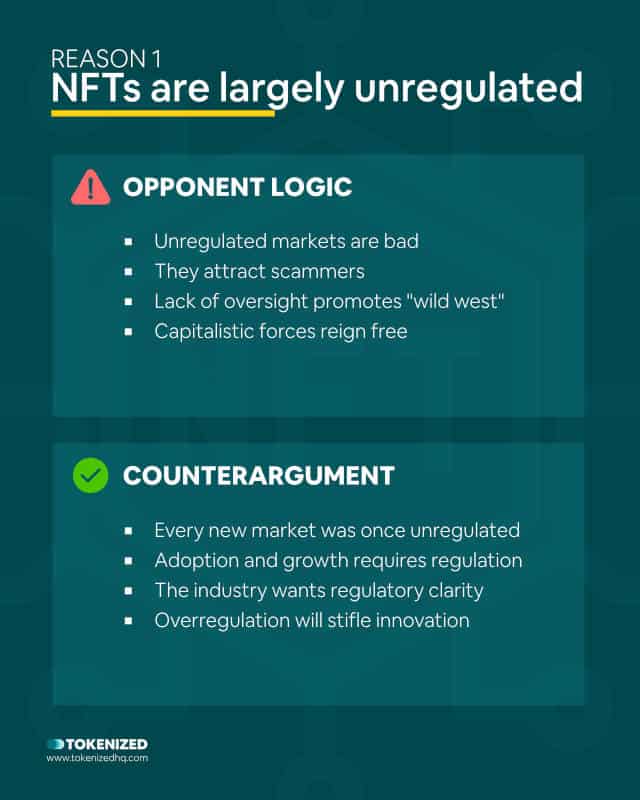
It is a fact that NFTs and most of the cryptocurrency industry are still largely unregulated.
Proponents of governmental controls and oversight generally do not like unregulated markets.
This is absolutely understandable because history has shown us many cases where unregulated markets have caused tremendous damage to the public.
Financial markets are the most obvious example of this, but it also applies to many industrial sectors as well.
The purpose of regulation is to help provide legal clarity on what the “rules of the game” are.
Unfortunately, opponents of NFTs and crypto are primarily using it as an argument to smother and destroy the market as a whole.
They are not interested in regulation as a guiding framework.
They want to stop it altogether.
The Counterargument
- The cryptocurrency industry has been begging legislators to finally provide regulatory guidance.
- Leading companies have lobbied for appropriate regulation because they know that regulation is critical for adoption and growth of the blockchain industry.
- However, they are also of the view that regulation should not stifle innovation.
- Let’s not forget that every industry that is built on new technology, was once unregulated.
- So the fact that cryptocurrency is still largely unregulated, doesn’t make it inherently bad.
2. NFTs Are a Bubble!
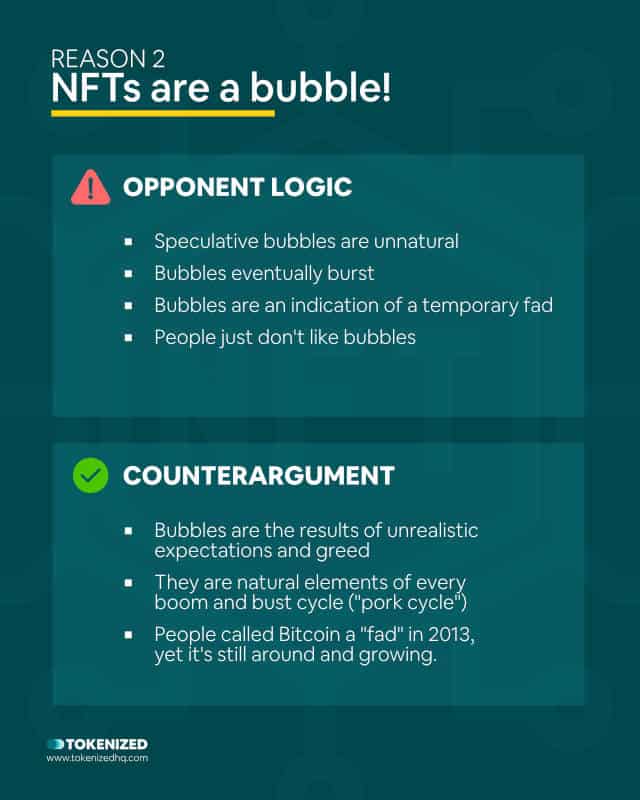
When did the term “bubble” become synonymous with “evil”?
Every time you find an article in a major news outlet, you’ll invariably find someone using the “bubble” word in the comments section.
Why do people hate NFTs and crypto so much?
Because it’s a bubble, stupid!
The public’s dislike of bubbles is something that can be observed in all sorts of places.
- The stock market is a bubble.
- The real estate market is a bubble.
- Bitcoin is a bubble.
- And NFTs are a bubble for sure!
- Heck, the world’s in an everything bubble.
And you know what? They’re probably not wrong.
Speculative bubbles have been around for centuries and they usually leave behind quite a bit of destruction.
At least amongst the people who voluntarily participated in them.
And so, for many people, anything that suffers from speculative bubbles is inherently bad.
The Counterargument
- Speculative bubbles are caused by an unhealthy mix of unrealistic expectations and greed.
- However, most markets go through boom and bust cycles already.
- This is often referred to as the “pork cycle”, which describes cyclical fluctuations in supply and prices in livestock markets.
- Does this make them inherently bad? Of course not.
- In 2013 people claimed Bitcoin was a bubble. Then it burst. They said the exact same thing in 2017. And again, it burst.
- Yes, it’s a cycle but that doesn’t make it evil.
3. Scammers & Fraudster Use NFTs
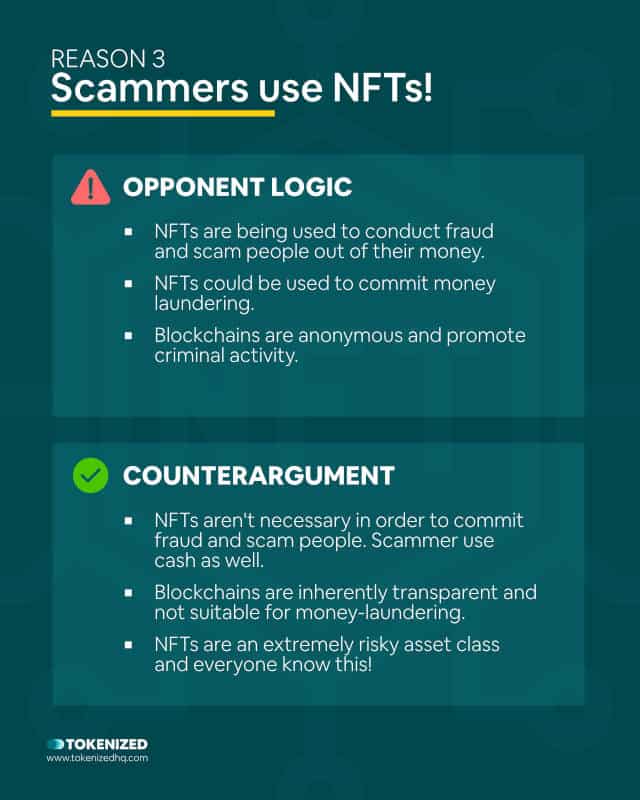
So, why do people hate NFTs so much?
Because it seems to be attracting scammers.
And it’s true that the number of scams and so-called “rug pulls” grew significantly in February 2022.
Let’s face it, any market that is unregulated and that attracts so much capital will invariably also come with fraud.
And when NFT marketplaces such as OpenSea don’t introduce effective verification measures, it makes it so much easier for criminals to screw people over.
It should also be noted that, unlike stocks, there’s no fundamental way to value NFTs properly. At least not yet!
The value of an NFT is exclusively driven by what other people are willing to pay for them.
Someone who’s familiar with the art market or collectibles understands this.
However, most people don’t.
The Counterargument
- Just because something can be used for fraud, doesn’t automatically make it bad.
- Fraud and scams are everywhere. You can get scammed in eCommerce. Criminals use cash, a lot! So should they both be illegal? Of course not.
- Let’s face it: Investing in NFTs is very risky and should only be done by people who can afford to lose some money.
- And this is a warning that is repeated over and over again.
- If you conduct proper due diligence and follow common security guidelines, you can safely invest in NFTs.
- But honestly, a lot of people choose to ignore this.
4. NFTs Are Killing Our Planet
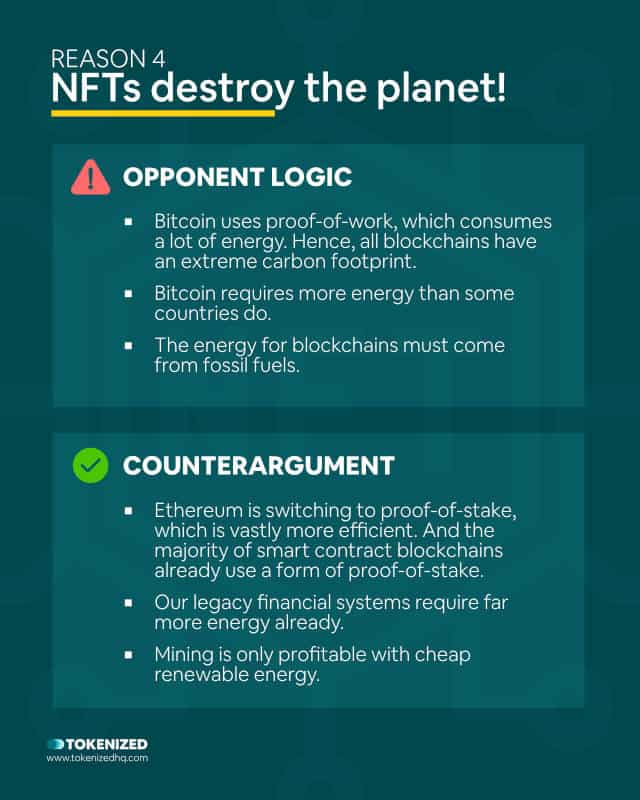
If you asked me “Why do people hate NFTs?”, I would most likely say that it’s because of crypto’s carbon footprint.
One of the biggest criticisms of NFTs and cryptocurrency is that their consensus mechanisms require significant amounts of energy.
This holds especially true for some of the most popular and decentralized networks, such as Bitcoin and Ethereum.
Both use Proof-of-Work to secure the network and it is true that it is a very inefficient way to do so.
Decentralization inherently requires redundancy and will always be less efficient than a centralized solution.
Opponents of cryptocurrency are especially big fans of comparing the power usage of Bitcoin to entire countries.
This makes for really great headlines that catch the public’s attention.
The Counterargument
- Although Bitcoin is obviously the poster boy of the crypto scene, its market share and relevance are steadily declining.
- Today’s cryptocurrency industry is dominated by blockchain networks that support smart contracts.
- In other words, these are networks that allow you to build applications on top of them and Ethereum is currently the biggest player in this space.
- Even though Ethereum still uses Proof-of-Work, it is in the process of converting its consensus mechanism to Proof-of-Stake.
- Proof-of-Stake is vastly more efficient and nearly all other relevant blockchain networks use some form of this consensus mechanism.
- The argument around the environmental impacts of blockchain is very popular, however, it is also incredibly hypocritical.
- Critics are completely ignoring how most of the legacy systems of money and technology are considerably more energy-intensive than digital ledgers.
5. Artists Are Being Ripped Off
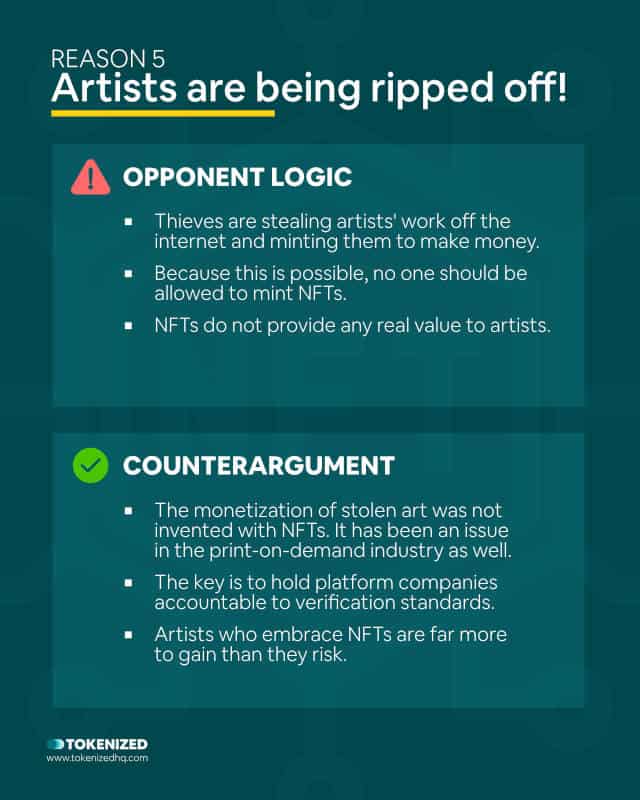
Why do artists hate NFTs?
Why is it that those who stand to gain the most from NFTs are amongst the most vocal haters of NFTs?
It’s not so much about the technology itself but rather what people with criminal energy are doing with it.
This is the exact same thing that has been tormenting the print-on-demand industry for so many years.
The internet makes it very easy for someone to steal someone’s artwork and monetize it elsewhere without being noticed.
And this is exactly what has been happening with many lesser-known artists whose artwork was minted and sold by thieves as NFTs.
The Counterargument
- We totally understand that this is frustrating for many artists. This is a common problem on the internet.
- Stolen artwork is sold on printed t-shirts and other apparel every day on platforms like Amazon, Redbubble, or Spreadshirt.
- Is that a good reason to hate the entire print-on-demand industry or the blockchain industry as a whole? We don’t think so.
- If anything, it’s an argument to hold the platforms more accountable.
- From a macro perspective, the opportunities for artists greatly outweigh the risks that come with NFTs.
6. Most People Will Lose Money
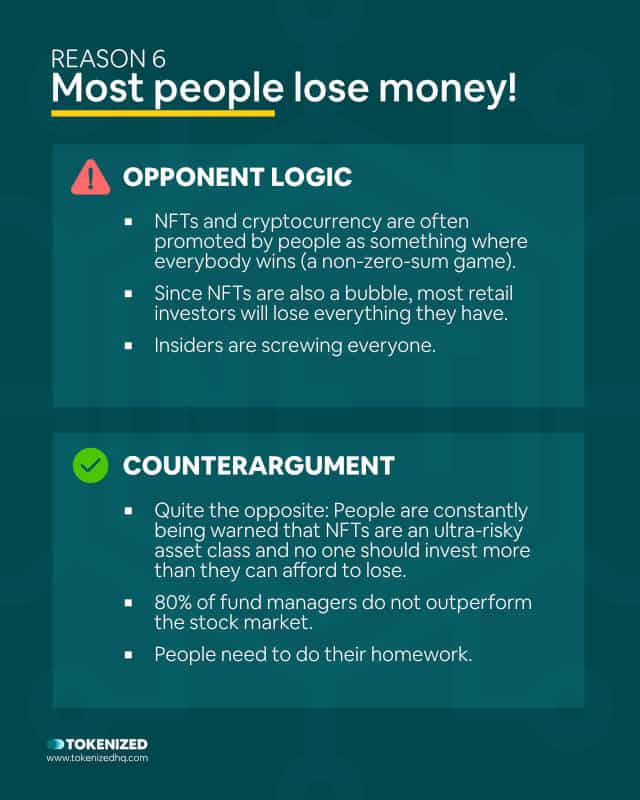
Amongst all of the answers to the question “Why do people hate NFTs?”, this is one of the weakest ones.
Opponents of NFTs are quick to point out that most people will lose money.
This is an interesting point because it assumes that everyone can win.
And, fair enough, some of the most obnoxious characters in the space like to use the hashtag #wagmi, which stands for “We’re all gonna make it”.
Of course, this statement is utterly false and incredibly unrealistic.
Superficially, in the short term, this is absolutely a zero-sum game.
The Counterargument
- The fact that many people will lose money on their investments is not a good argument against the industry as a whole.
- 80% of active fund managers perform worse than the market. This is a fact.
- And of course, most people are horrible traders. This is nothing new.
- Any high-risk asset class comes with the risk of losing your investment.
- Buying NFTs right now is essentially like investing in early-stage startups. Is that illegal? No it isn’t.
7. The Cost of Minting NFTs is Obscene
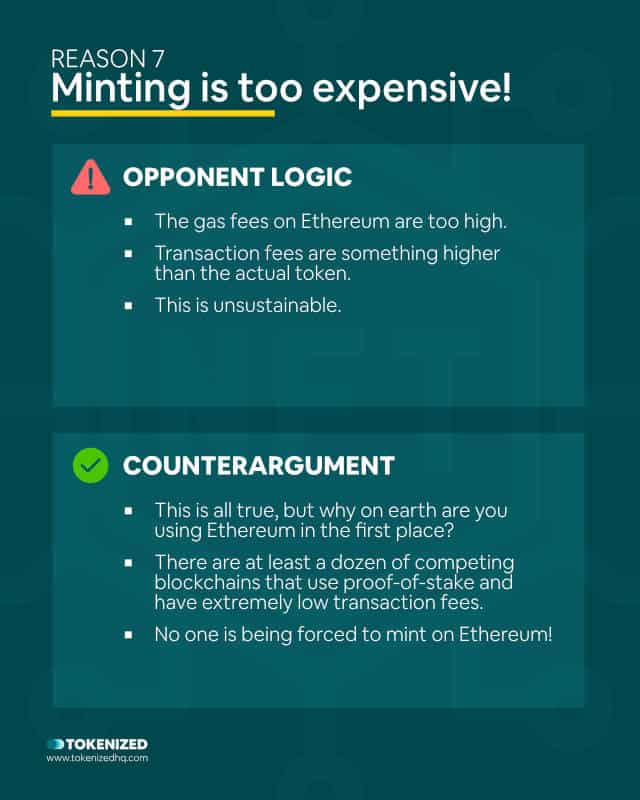
Without a doubt, one of the biggest problems with NFTs is the excessive fees on the Ethereum blockchain.
Since Ethereum is still the blockchain of choice for most NFT creators, the unprecedented demand has had quite an impact on OpenSea gas fees.
In times of peak demand, the cost of minting can easily be vastly higher than the value of the token itself.
And the situation has mostly been sustained because the most popular NFT projects are built on Ethereum.
The Counterargument
- Using this as an argument against NFTs is silly. If anything, these massive gas fees will prevent the industry from growing further.
- Or, what’s even better, is that projects will start to migrate to more efficient blockchains that use Proof-of-Stake.
- You see, minting NFTs does not have to be expensive.
- However, the market perceives Ethereum NFTs as a “premium” category and that is why demand it is so much higher there.
Conclusion
So, if you’ve been asking yourself “Why do artists hate NFTs?” or “Why do gamers hate NFTs”, then we hope we finally provided you with a good answer.
We’re not going to lie: We are firm believers in NFTs and want this space to flourish.
Of course, we understand a lot of the criticism and many of the points that opponents of NFTs make are valid to a certain extent.
However, we believe it is important to have a more honest and neutral debate with less emotion and aggression.
Cryptocurrency and NFTs are not going to go away, so instead of fighting it, let’s rather look for ways to address the issues and find common solutions.
Here at Tokenized, we want to help you learn as much as possible about the coming NFT revolution. We help you navigate this fascinating new world of non-fungible tokens and show you how you can integrate tokenization into your own business.



